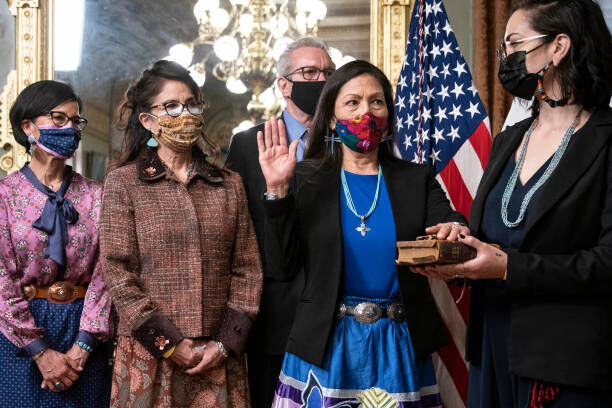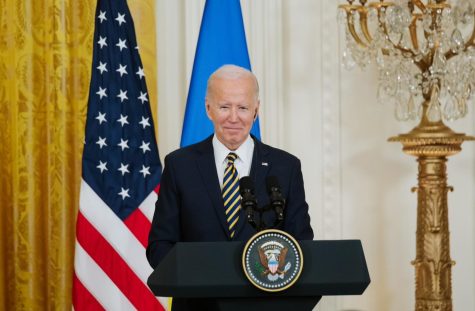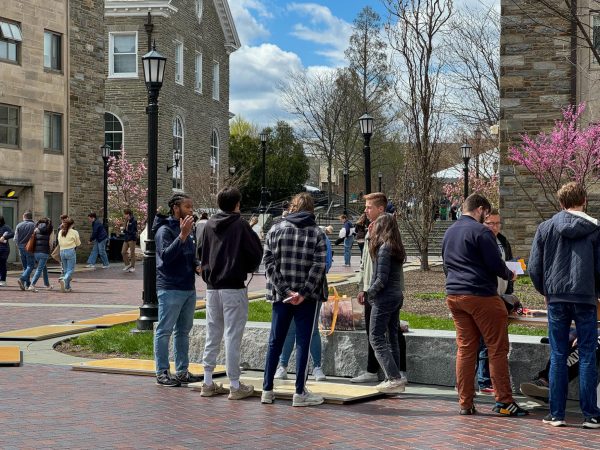Deb Haaland Becomes First Native American Secretary of the Interior
Courtesy of Sarah Silbiger, Getty Images
Upon her swearing-in on Thursday, March 18, Deb Haaland became the first Native American cabinet secretary in U.S. history.
March 24, 2021
Upon her swearing-in on Thursday, March 18, Deb Haaland became the first Native American cabinet secretary in U.S. history. The significance of her confirmation as the 54th Secretary of the Interior was indisputable as she took her oath of office proudly wearing apparel and accessories honoring her indigenous heritage and identity.
The ceremony followed a month-long process. President Joe Biden announced his selection of Haaland as his nominee in December 2020, but the formal hearing process was pushed to February of this year. The Senate eventually confirmed Haaland as Secretary of the Interior on March 15 in a 51-40 vote, with four Republican senators joining Democrats in the vote to confirm.
Haaland previously served in several New Mexico state-level political roles and was elected to the House of Representatives in 2018 to represent New Mexico’s first congressional district. Her 2018 election to the House was groundbreaking in its own way, too, as Haaland and newly-elected Kansas Congresswoman Sharice Davids became the first two Native American women to be elected into Congress.
As a member of the Laguna Pueblo, Haaland’s indigenous identity is especially poignant considering this particular cabinet role. The Department of the Interior has historically been a source of oppression and subjugation of Native Americans and their lands, and many within the indigenous community see Haaland’s confirmation as a symbol of potential progress in the Biden administration.
In an op-ed last month discussing Haaland’s nomination, Traci Morris, member of the Chickasaw Nation and Executive Director of the American Indian Policy Institute at Arizona State University, voiced this sentiment.
“Having [Haaland] in leadership gives Native America a seat at the policymaking table,” Morris said.
Alongside the massive symbolic role of her nomination and confirmation, many point to Haaland’s expertise and record as qualification for her selection as Secretary of the Interior. As Congresswoman, she served as Vice Chair of the House Committee on Natural Resources and Chair of the Subcommittee on National Parks, Forests and Public Lands. Both roles are relevant to the areas she will be closely involved with in this new position.
The importance of her role beyond symbolic significance was a point raised by Haaland herself during the confirmation hearing process.
“The historic nature of my confirmation is not lost on me, but I will say, it is not about me,” Haaland said at her Feb. 23 Senate confirmation hearing. “Rather, I hope this nomination would be an inspiration for Americans — moving forward together as one nation and creating opportunities for all of us.”
The particular form that “moving forward” will take under Haaland’s leadership is expected to align with her political and ideological record. Many on both sides of the political spectrum expect progressive policy to be a priority, especially in matters of ecological concern like fracking and other issues involving the oil and gas industries.
This expectation is largely what led to such a partisan divide in the confirmation vote. Republican senators pointed toward Haaland’s past and present stances, including her membership of the Congressional Progressive Caucus and staunch support of the controversial Green New Deal, as overly extreme.
“I’m deeply concerned with the congresswoman’s support on several radical issues that will hurt Montana, our way of life, our jobs and rural America,” Senator Steve Daines (R-MT) said.
However, many environmental groups and politicians on the left hailed Haaland’s nomination and confirmation as an overdue move toward action combating climate change. This sentiment is visible in the Sunrise Movement, an environmental organization among the first to push for Haaland’s nomination following Biden’s election.
“A visionary Secretary of the Interior has enormous latitude to crack down on giveaways to fossil fuel corporations, like permits to drill for oil on public lands and in public waters,” the group stated. “With a progressive leader at the helm, we can make real progress.”
Haaland’s particular policy and leadership decisions will continue to unfold throughout her tenure as Secretary of the Interior, but the historic nature of her confirmation is undeniable as a move toward greater representation of Native America on a national level.














